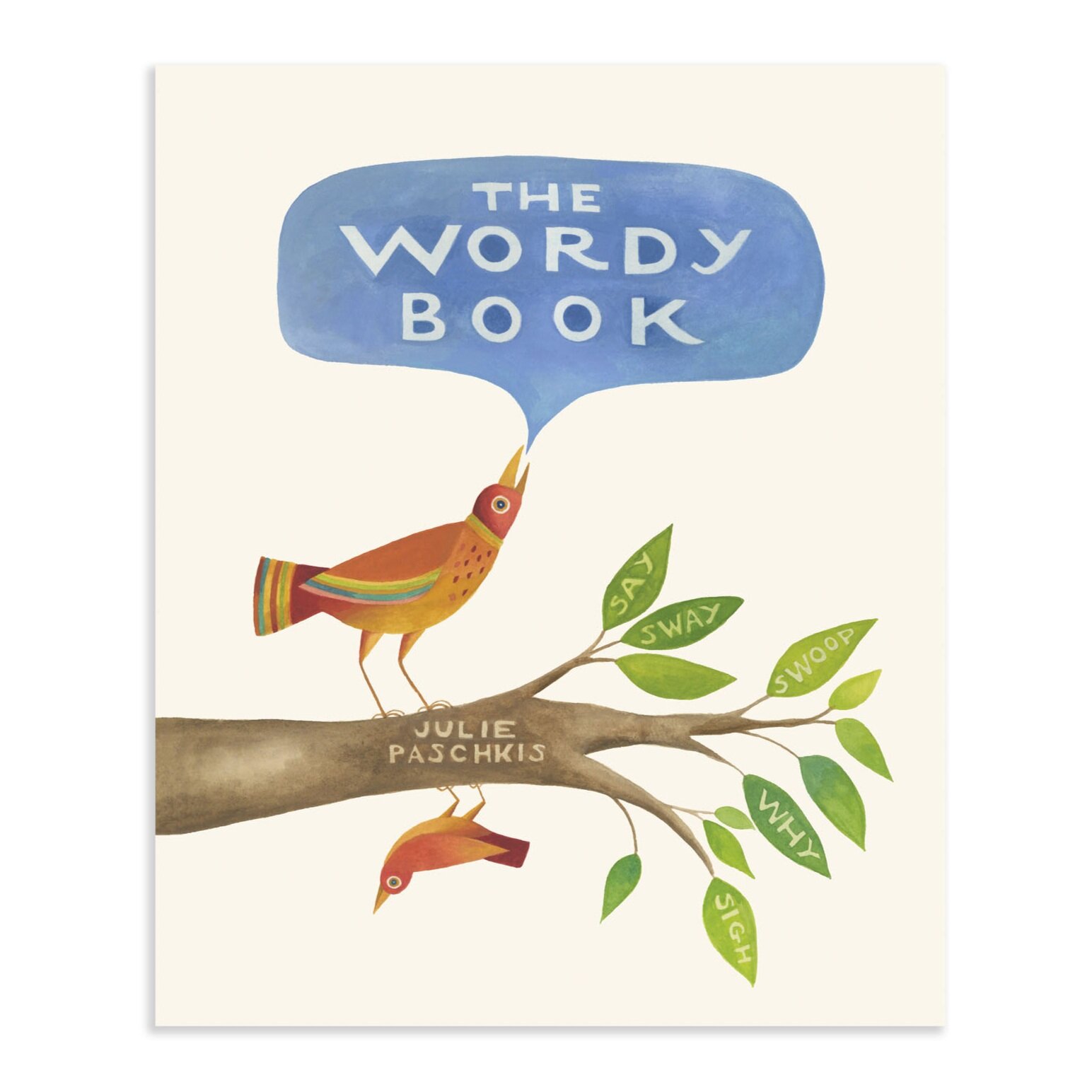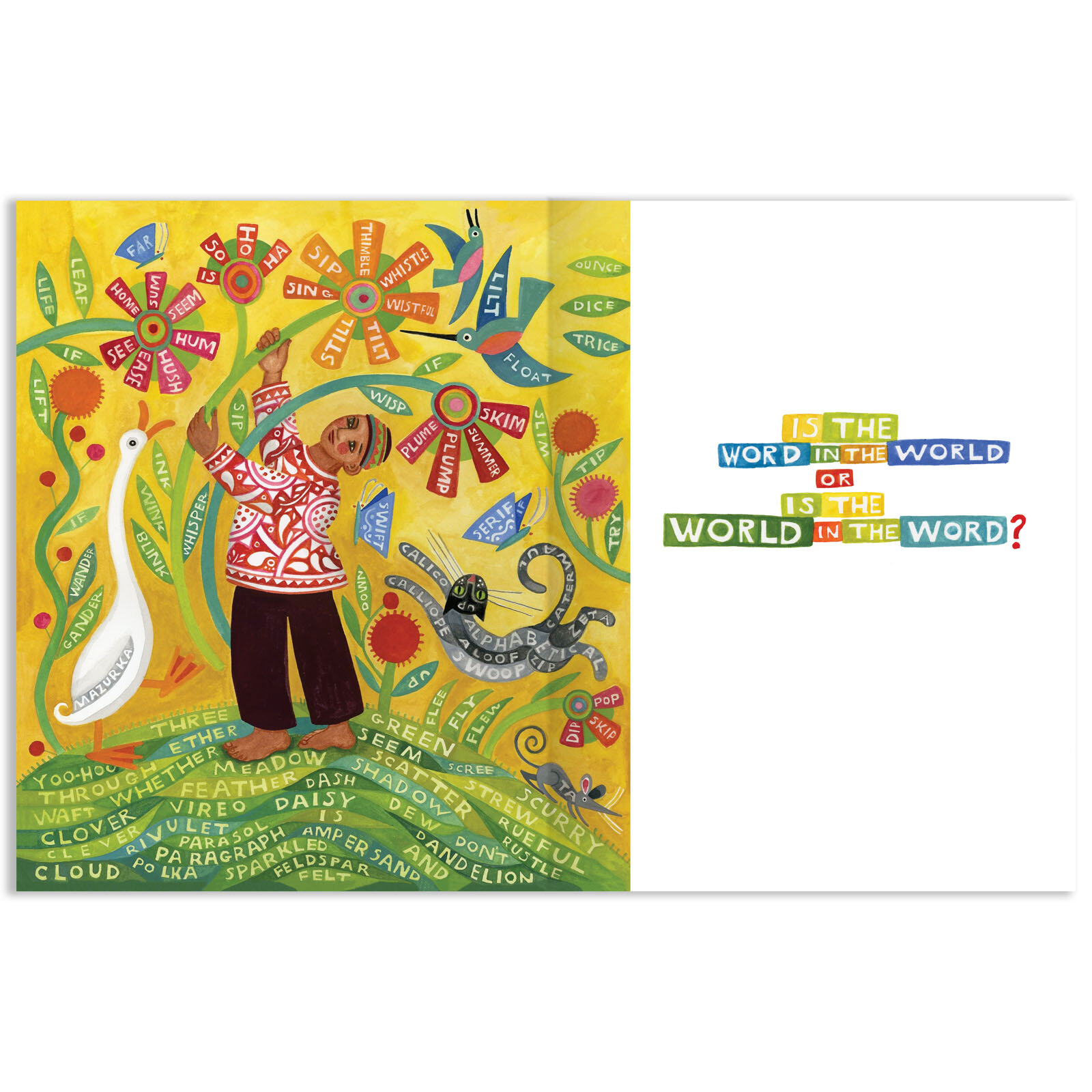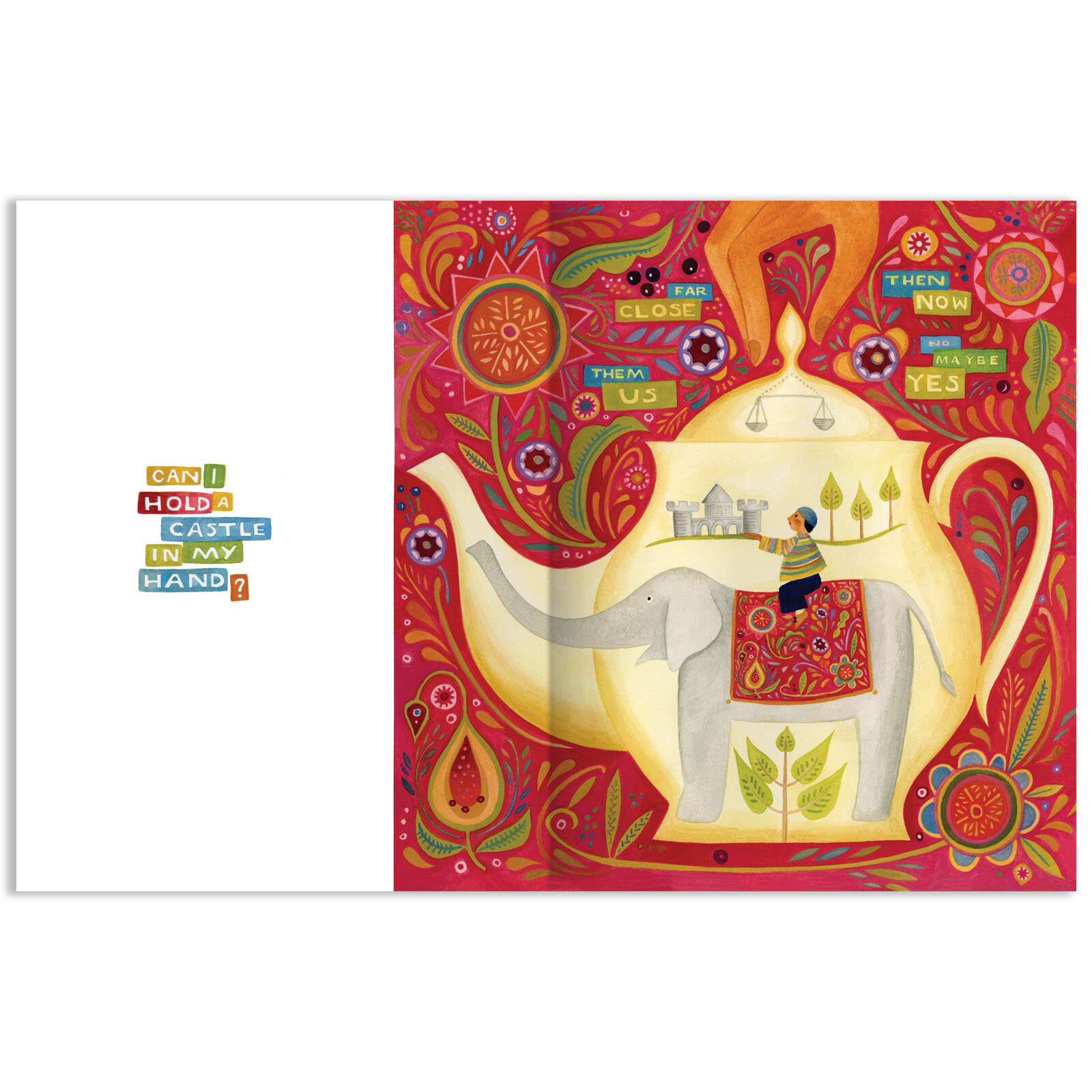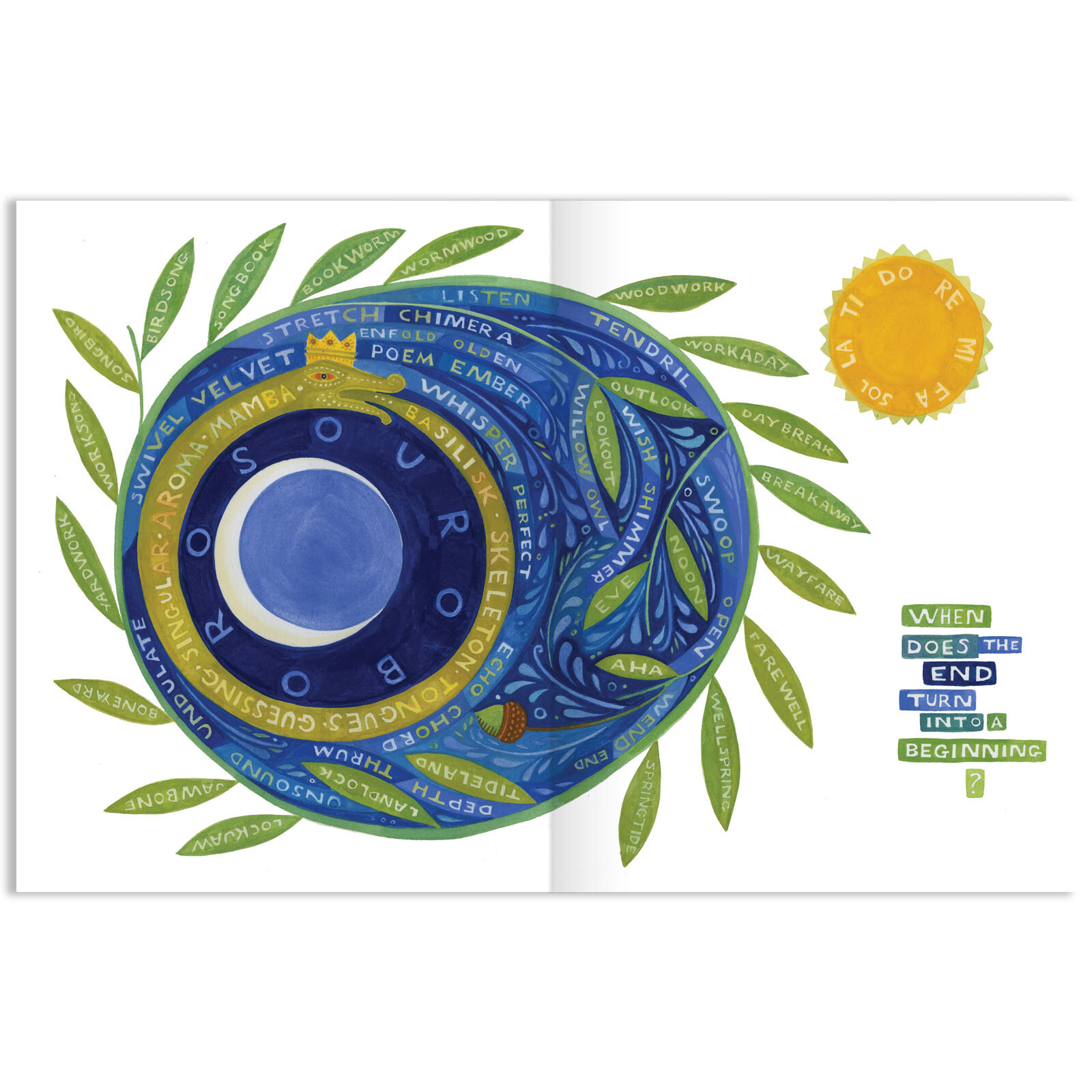The Wordy Book






The Wordy Book
*This title will also be available on Bookshop, an organization that supports independent bookstores!
Written and illustrated by Julie Paschkis
“Some children’s books feel like classics the first time one encounters them. It’s not hard to imagine young poets embracing The Wordy Book as warmly as new generations keep embracing The Little Prince.” ―Naomi Shihab Nye, for the New York Times
★ A Publishers Weekly High-Concept Picture Book for Children
★ Selected for 2021 Society of Illustrators Original Art Exhibition
With surrealist paintings bursting with words, bright colors, and unexpected juxtapositions, this book explores how playing with a word’s sound, form, and context can shape its meaning. Each painting asks a question, which can be answered with the words and pictures that make up the image, or with the reader’s own words. Playfully expressive, this celebration of the imagination will give its readers a newfound appreciation for the richness, beauty, and vitality of language.
ISBN: 978-1-59270-353-1
8.5” (W) x 11” (H) • 44 Pages • HCJ
AWARDS & REVIEWS
★ A Publishers Weekly High-Concept Picture Book for Children
★ Selected for 2021 Society of Illustrators Original Art Exhibition
“Some children’s books feel like classics the first time one encounters them. ‘What does a word think about?’ the artist and writer Julie Paschkis asks on the first double-page spread of The Wordy Book. This and other evocative questions… punctuate a dazzling array of richly colored, riveting paintings. Folkloric and elegant, this book invites slow, meditative drifting. Paschkis is the illustrator of more than 25 children’s books, and her poetic sensibility girds every page. Absorbing layers of waves, leaves and petals, boats, birds and people, all threaded with words, sustain the magic of her visual language. The whole head full of ‘maybe,’ with the word ‘yes’ repeating inside a smaller head, is a miracle of whimsy and wonder. An engaging author’s note reminds us that ‘a word can be savored for its sound and shape as well as for its meaning’ and that ‘the meaning can be fluid.’ It’s not hard to imagine young poets embracing The Wordy Book as warmly as new generations keep embracing The Little Prince.” — Naomi Shihab Nye, for the New York Times
★ “Talk about painting with words. Author/illustrator Paschkis plays with them, too, and encourages readers to do likewise. In the process, she explores the elasticity and seemingly endless possibilities of language. The vividly colored, wittily detailed, folk-style paintings on double-page spreads organically incorporate words into the artwork in wondrous, creative ways. Words frequently repeat in different sizes and colors; illustrated images include words that sound or are shaped like them, are variations of them, rhyme or nearly rhyme with them, sort of resemble them, are sort of spelled like them, etc. A bouquet of flowers in a vase sports roses exuding the scents of slumber, sultry, shush, and other evocative words beginning with S; on a daisy’s petals readers find dizzy, doozy, lazy, jazzy; lief, leap, life, and more decorate the leaves. Delightful words—many of which readers won’t know, and that’s OK—flex vocabulary and spelling muscles to the max and also enhance readers’ visual and auditory senses when the pictures are taken in. Furthermore, the spreads are connected to thought-provoking questions. Some inspired the paintings, or vice versa, and themselves contain examples of wordplay. Persons depicted have diverse skin tones. The book makes a great springboard for creative-thinking activities in writing and art units in classroom and library programs. Keep dictionaries handy. Endpapers abound with swirling words readers can savor (and look up). In a word, a feast for the eyes, brain, and artistic imagination.” —STARRED REVIEW, Kirkus
“There is an Alice in Wonderland quality to the book: The questions play with the limits of logic (What tells me more, an IF or an OR?) and with the existential restlessness of childhood (When does there become here? When does then become now?); they invite the fundamental curiosity at the heart of compassion (Do you see what I see?) and emanate a radiant love of life (What is the sum of a summer day?) consonant with the vitality of Paschkis’s paintings — this parallel language of shape and color just as rich and eloquent as the language of words, as playful and abstract as the language of mathematics.”—Maria Popova, The Marginalian
“Words are the subject of this reverie by Paschkis, who incorporates them into striking, dreamlike folk-art. In rhythmic compositions that feature birds, mammals, and humans wearing intricately patterned clothing in shades of blue, fresh greens, deep fuchsia, and dramatic black, areas of color are paved with small tiles, each one emblazoned with its own hand-lettered word… Questions lead only to more questions in this mesmerizing exploration of sound, form, and color. Back matter features an author’s note.” —Publishers Weekly
“Devoted to the tricks and beauties of the English language, The Wordy Book, by Julie Paschkis, has lush illustrations and an enigmatic text that would be useful for sparking conversation at bedtime with anyone over perhaps the age of 4 or 5. 'When does there become here?' Ms. Paschkis asks. 'What tells me more—an if or an or?' These posers are accompanied by richly colored folkloric pictures, many with words woven into their patterns. The question 'Do you see what I see?' runs beside a painting of a white vase—or is it the space between two silhouetted faces?—with flowers whose petals and leaves are decorated with words such as 'happy/sappy/zippy' and 'worry/flurry/fury.' The strangeness is part of the beauty; the beauty is in the strangeness.”— Wall Street Journal
“With tree trunks whose bark is layer on layer of sinewy words, with landscapes that curve and coax along with playful energy about sounds and meanings, and with a sensibility that is part New Age and all childlike, Paschkis winds her way through paintings that ask questions and questions that point to many answers. The art is folkloric, with colorful birds, animals, and people, but also surreal in the compositions, which provide readers with plenty to consider… This book asks a lot but has perfect appeal for the dreamy child who loves to be immersed in both words and pictures.” —School Library Journal
“This mesmerizing, exquisitely designed book includes new paintings as well as a collection of paintings that Paschkis, one of my favorite illustrators, has created over the years… She pairs these paintings with thought-provoking questions, some more mysterious (‘When does the end turn into a beginning?’) than others (‘Could you please repeat that?’). Delightfully, each painting bursts with words: They beg the reader to slow down and linger. They remark upon the artwork, and the artwork extends their meaning. They nudge, interrogate, and provoke. Pay close attention to what many of these words are doing. In the final spread, Paschkis asking readers when the end becomes a beginning, word pairs are closely related in the way the question suggests: ‘Poem / Ember.’ ‘Swoop / Open.’ ‘Swivel / Velvet.’ In each spread, you can see for yourself some of the vibrant palette and expert compositions. This one is a beauty. It possesses a playfulness and vitality that is all its own. It’s one for sharing—and revisiting often.” —Julie Danielson, Seven Impossible Things
“This gorgeously illustrated book is full of words waiting to be discovered! Snuggle up and get ready to spend hours reading and re-reading this dreamy, mesmerizing book, where art and literature go hand in hand.” —Kate Towery, Fountain Bookstore (Richmond, VA)
